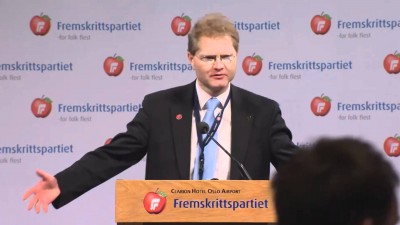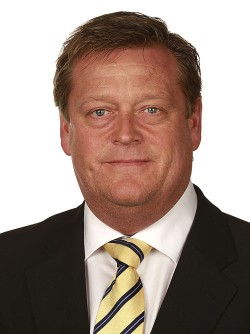Tor Andre Johnsen, a Member of Parliament (MP) for one of the two parties holding government power in Norway, has been warned twice by Norway’s police intelligence unit PST for having too much contact, also socially, with Russian diplomats in Oslo who are believed to actually be Russian intelligence officers. Johnsen initially disagreed with and ignored PST’s advice, but his party leaders now say Johnsen will “of course” be expected to follow it.

Newspaper VG reported Tuesday that Johnsen, who also serves as a member of Norway’s delegation to the Organization for Security & Cooperation in Europe (OSCE), was advised to cut contact with Russians identified by name who work at the Embassy of the Russian Federation in Oslo.
VG wrote that PST (Politiets sikkerhetstjeneste) officers were so worried about Johnsen’s contact with the Russians that they asked for a face-to-face meeting with him at the Parliament. PST also informed the parliamentary leader for Johnsen’s Progress Party, Harald Tom Nesvik, about the meeting.
VG reported that Johnsen, in the first meeting with PST, was told the Russians named were identified as intelligence officers who are in Norway under the cover of being diplomats. If Johnsen nonetheless wanted to maintain contact with them, PST recommended that all meetings should take place openly at the Parliament during daytime hours, not in social settings such as restaurants or other private situations.
Johnsen reportedly responded to PST and told several other colleagues at the Parliament that he disagreed with PST’s advice and didn’t intend to follow it. PST then observed that Johnsen did indeed continue to meet his Russian contacts despite its warnings.

That prompted PST officers to go to the unusual step of asking for a second meeting with Johnsen, a 46-year-old politician from Hedmark County in southeastern Norway who has been an MP for less than two years. At the second meeting, PST repeated and stressed the importance of its advice, apparently in the context of national security. PST also alerted Nesvik.
Johnsen, who is a member of the parliamentary committee dealing with labour and social issues, claims he has done nothing improper and has nothing to hide. He told VG that his contact with people he considers to be Russian diplomats is of an “ordinary character.” He would not reveal to VG the identity of the contacts believed by PST to be intelligence officers. Nor would PST reveal their identities.
Arne Christian Haugstøyl, leader of the PST division that works to prevent important information from falling into the wrong hands, told VG, however, that they have felt compelled on several occasions to warn Members of Parliament against social contact with employees of embassies in Oslo. He said that “most often, they listen to us. But yes, we have had situations where we’ve had to have repeat meetings” with the MPs.
Haugstøyl would not comment on whether PST had been in contact with Johnsen, but the Progress Party’s own communications chief, Andre M Larssen, wrote in an email to VG earlier this month that Johnsen himself had taken the initiative for “several of the meetings with PST … and he points out that he of course listens and follows the advice he gets from them.” VG maintains that those meetings took place after the first two that PST initiated.
Progress Party claims PST meetings were ‘no secret’
Nesvik of the Progress Party refused for more than a month to answer questions from VG about PST’s concerns over his party fellow’s close contact with Russian Embassy personnel. Nesvik told Norwegian Broadcasting (NRK) on Tuesday, however, after VG broke its story about Johnsen’s Russian contact, that Progress Party MPs are expected to follow the advice given them by PST.
“It’s no secret that Tor Andre Johnsen and myself have had regular meetings with PST,” Nesvik told NRK Tuesday morning. “I have also had regular meetings with PST. But what’s gone on in those meetings will stay with us.” Nesvik refused to divulge the content of the discussions with PST on the grounds the were “internal meetings.”
“But when PST extends advice, we of course follow that advice,” Nesvik claimed. At the same time, he said on national radio Tuesday morning that he believes it’s important to maintain contact with representatives of foreign countries who are based in Oslo. That includes Russian diplomats, also at a time when relations between Norway and Russia are strained because of Russia’s intervention in Ukraine.
Promoted a Russian security proposal
Johnsen, meanwhile, as a member of Norway’s delegation to the OSCE, last year worked actively to get the delegation to support a controversial proposal from Russia about European security policy. Nesvik admitted to NRK on Tuesday that should not have happened.
VG reported that on June 12 of last year, Russia’s national day, the six MPs in Norway’s OSCE delegation met at the Parliament to prepare for the most important OSCE meeting of the year, which would deal with the then-new Russian intervention in Ukraine. Norway had already joined the US and the EU in supporting sanctions against Russia, yet Johnsen wanted the delegation to support a Russian proposal regarding the fight against terrorism. Johnsen, who has a Ukrainian wife, lobbied hard for the proposal, presented in the midst of the Ukraine crisis, even though doing so also defied the Progress Party’s own politics. He failed to get the delegation’s support, but eventually signed it on his own, breaking away from the group and, in the view of other MPs, diluting Norway’s solidarity on the issue.
“Our parliamentary group was not aware of this before now, it was an OSCE meeting,” Nesvik said on national radio on Tuesday. “But in hindsight, we see that it can be interpreted incorrectly, and we must learn from that.”
Johnsen has periodically been on sick leave this spring and Parliament has now adjourned for the summer. He has refused to answer VG’s questions about his contact with the Russians and his conduct with the OSCE delegation, but sent a general comment to VG in which he defended his interest in Russian affairs and his desire to maintain his own Russian language skills. He wrote that he was keen for Norway to maintain a “good dialogue” with other nations “and especially our neighbours.” and that he had been “careful not to make any mistakes,” adding that he had “only open and official contact with other nations and embassies at a lower political level, in line with my position as a Member of Parliament.”
newsinenglish.no/Nina Berglund

